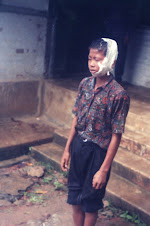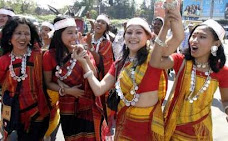October 25th, 2007
To
Dr. Fakhruddin Ahmed Chief Advisor
Interim Caretaker Government
People's Republic of Bangladesh
Dhaka, Bangladesh
Subject: Continuous land-grabbing, false imprisonments in Chittagong Hill Tracts;
Dear Chief Advisor,
The Jumma Peoples Network UK, would like to congratulate the taking of office of your government for the purpose of eliminating corruption, crime & injustice from Bangladesh society and for the establishment of a truly democratic, accountable and transparent country.
At the same time we regret to observe that the indigenous people are not being able to enjoy the success of your government. They are facing dispossession of their lands, eviction, extra-judicial killings and suppression of their activities.
We are saddened to learn that illegal settlers with the help of the military have intensified the process of confiscating lands belonging to the Jumma indigenous people after the imposition of Emergency Rule in January 2007.
For your information, we’d like to mention the following cases & incidents:
Land-grabbing
- In March 2007 Ruma cantonment acquired about 7,570 acres of ancestral land belonging to indigenous people for extension of its garrison and ordered more than 400 families to leave the area. In Bandarban district alone, 40,077 acres of land have been given in lease to illegal settlers while a total of 94,066 acres of land were acquired for so-called afforestation projects and 75,686 acres were acquired for establishment of military bases in the district.
In another recent case of land-grabbing, illegal settlers have reportedly taken over 59 acres of land belonging to 17 Jumma people in Kobakhali mouza (No. 51) under Dighinala police station in Khagracahari district. In an operation lasting from 1st to 15th August 2007, large groups of settlers led by former Union Parishad (UP) member Mohammed Abu Taleb of Hashinchonpur village and former UP member Mohammed Kader of Kobakhali bazar took control of the hilly lands belonging to Chakma people with the direct assistance of the army, the para-military forces and the local Village Defence Party (VDP) members.
Due to the presence of the security forces, that provided protection to the illegal setters, the people could not offer any resistance. Presently, works for construction of houses on lands seized from indigenous peoples are reportedly underway. The army has reportedly planned to settle 200 plain settler' families in the same mouza.
-In June 2007, the military reportedly settled down at least 200 Bengali settler families at Dhankupya village under Khagrachari district after forcibly evicting 12 indigenous families from their ancestral lands. Earlier, on 8 March 2007, an army camp was set up on the land of Prithviraj Chakma at the same village to protect the settlers.
You will also be aware about the on-going activities of the Bangladesh military that has unleashed a reign of terror across the CHT by carrying out extrajudicial killings, arbitrary arrests, illegal detention, lodging false cases and terrorizing the people by frequent raids, military operations, torture, threats and intimidation.
Extra-judicial killing
-On 5 August 2007, Rasel Chakma, son of Paritosh Chakma of Dewan Para village under Naniarchar upazilla (sub-district) in Rangamati district was arrested by the security forces and killed in custody. The security forces claimed that he died of a heart attack but the body reportedly bore injury marks of torture.
-Earlier, on 3 March 2007, a group of army personnel from Ghilachari camp under Naniachar Thana arrested Suresh Mohan Chakma, son of Phedera Chakma at Choichari village in Rangamati district without any warrant or reason. The victim was tortured at Ghilachari army camp in Rangamati district and he died on 7 March 2007, a day after being released.
Arrest under false charges
It has also been observed that Jumma activists have been unfairly targetted by the military that are taking advantage of the Emergency situation. Since the declaration of Emergency on 11 January 2007, at least 50 Jumma activists have been arrested, including 20 members of PCJSS (Parbattya Chattagram Jana Sanghati Samity) and 10 members of UPDF (United Peoples Democratic Front).
False cases such as extortion, kidnapping, murder etc have been lodged against the arrested activists. During raids, the military plants weapons and ammunition and claims to have recovered the same from the houses of the detained persons to show a ground for arrest. Most cases have been filed under Section 16(b) of the Emergency Power Rules of 2007, which denies release on bail to the accused during the enquiry, investigation, and trial of the case. Many have been indicted by courts under the Arms Act.
Persecution of indigenous leaders
-In July this year, Satyabir Dewan, general secretary of PCJSS; Ranglai Mro, chairman of Sualok Union Parishad and headman of Sualok mouza and Bikram Marma, president of Kaptai upazilla PCJSS branch were sentenced to 17 years of jail for each by a court in Chittagong under the Arms Act for allegedly possessing illegal arms. Another indigenous leader, Sai Mong Marma, organizing secretary, PCJSS Kaptai upazilla branch was sentenced to 10 years in jail under the Arms Act.
It has been widely alleged that these leaders have been falsely implicated under the Arms Act for protesting against the injustices committed by the Bangladesh military in CHT.
For example, UP chairman Ranglai Mro was targetted for protesting against the eviction of 750 families of the Mro indigenous community from their lands to make way for an army training centre in remote villages of the Bandarban Hill District in December 2006.
-On 3 June 2007, human rights defender, Santoshito Chakma alias Bakul (age 52), who also serves as the general secretary of the Chittagong Hill Tracts Jumma Refugee Welfare Association was arrested by the police from the Chengi Square in Khagrachari town. His arrest was totally unlawful and politically motivated. He was arrested when he was returning home after attending a meeting of the Task Force on rehabilitation of the returnee Jumma refugees at the Circuit House. The police did not give any reason for his arrest.
-On 29 May 2007, Milton Chakma, assistant co-ordinator of the Hill Watch Human Rights Forum and also a leader of United Peoples Democratic Front (UPDF), was arrested from Chengi Bridge in Khagrachari without any arrest warrant. Mr Chakma was shown arrested on the basis of a First Information Report (FIR) filed by Mohammed Shahidul Islam, Sergeant (No. 3998686) of 24th Bengal Regiment. In the army records, he has been shown arrested on 31 May 2007, although the Bangladesh army had picked him up on 29 May 2007 from Chengi Bridge area. He was implicated in a false murder case.
-On 5 May 2007, Tatindra Lal Chakma, central committee member of PCJSS, was arrested in connection with false extortion case filed by Mohammed Fuyad Hussain, manager of Grameen Bank of Babuchara branch with Dighinala police station in Khagrachari district. The military allegedly compelled Mr. Hussain to file the false case against T. L. Chakma. This was proved when the complainant denied involvement with Mr. Chakma before the court and the court granted bail to Mr. Chakma in June 2007. But the bail was cancelled on 23 July 2007 as Mr. Hussain was forced to withdraw his statement under tremendous pressure from the military. Again on 2 August 2007, two false cases of murder have reportedly been filed against Mr. Chakma with the Dighinala police station to ensure that he is not released from jail. Presently, he has been kept at Khagrachari jail.
It is indeed a shame that the present government has failed to respect the rights of indigenous people worldwide (estimated to be around 350 million) & in particular Bangladesh by abstaining from voting on the United Nations Resolution on September 13th this year on the rights of indigenous people which was passed recently. Your government continues to ignore the presence of millions of indigenous people on Bangladesh soil.
Seeing all norms and practices of this rejection and ignorance of indigenous people’s presence implies putting them in more danger in their own land. Therefore, indigenous people of Bangladesh feel more insecure for their lives than ever before.
You are well aware that the Bangladesh government has signed a Peace Accord in 1997 with PCJSS, who represent the whole of Chittagong Hill Tracts. But it is very shameful for the government for not implementing its’ very important clauses. If the accord were fully implemented, the indigenous people of Chittagong Hill Tracts would feel more secure of their lives & property. Instead, the government is continuing to exhibit the CHT Regional Council as a show piece, which has no power to do anything. It is high time to implement the accord and we strongly urge your government to comply with all the remaining un-implemented clauses of the accord. Otherwise the renewed implantation of illegal settlers and continued land-grabbing will pose the most serious of threats to the Jumma people of the region. With indigenous leaders being implicated in false cases, one can only protest against such policies in Bangladesh only at one’s own peril.
In view of the above, we would like to mention the following issues to be considered urgently by your government:
1. Stop arresting Jummas under false charges;
2. No more land-grabbing for settlers & military installations;
3. Return stolen land to rightful indigenous owners;
4. Immediately halt State-sponsored settlements in CHT;
5. Release CHT political prisoners;
6. Immediately implement all provisions of CHT Peace Accord of 1997 including withdrawal of all military camps;
7. Rehabilitation of returnee Jumma refugees from India;
8. Drawing up a voter list as per the provisions of the CHT Accord;
9. Re-settlement of inducted Bengali settlers from CHT to elsewhere in Bangladesh;
Sincerely yours,
Jumma Peoples Network, UK
Website: www.jpnuk.org.uk
E-mail: Jpn_uk@hotmail.com
CC: Foreign & Commonwealth Office (FCO), London
Ministry of Foreign Affairs, European Commission, Brussels
United Nations High Commissioner for Human Rights, New York
Embassies & High Commissions of SAARC (South Asian Association for Regional Cooperation), London
skip to main |
skip to sidebar

Military enforcement

Survive

Torture

Raped & Killed Indigenous Jumma Women

Militarization in CHTs

Religious destruction

Land Grabbing

Indigenous Jumma Villeges burnt down

Atrocities


CHTs is a number one of Millitary Zone in the World.

With Traditional Dress
nandawansa

Military enforcement

Survive

Torture

Raped & Killed Indigenous Jumma Women

Militarization in CHTs

Religious destruction

Land Grabbing

Indigenous Jumma Villeges burnt down

Atrocities
Embassy in Los Angeles
About Bangladesh
Refugee in Homeland

News Papers
Audio & Video
Actrocities & Tortures

CHTs is a number one of Millitary Zone in the World.
Jumma Photo Albums
Jumma Links
Jumma Women

With Traditional Dress
Blog Archive
About Me
- IJPNUSA
- The Indigenous Jumma People Net in North America is for the movement of minority Jumma indigenous people in Chittagong Hill Tracts in Bangladesh. E-mail:jpnus@yahoo.com Webpage:-http://jummapeoplenet.blogspot.com/
